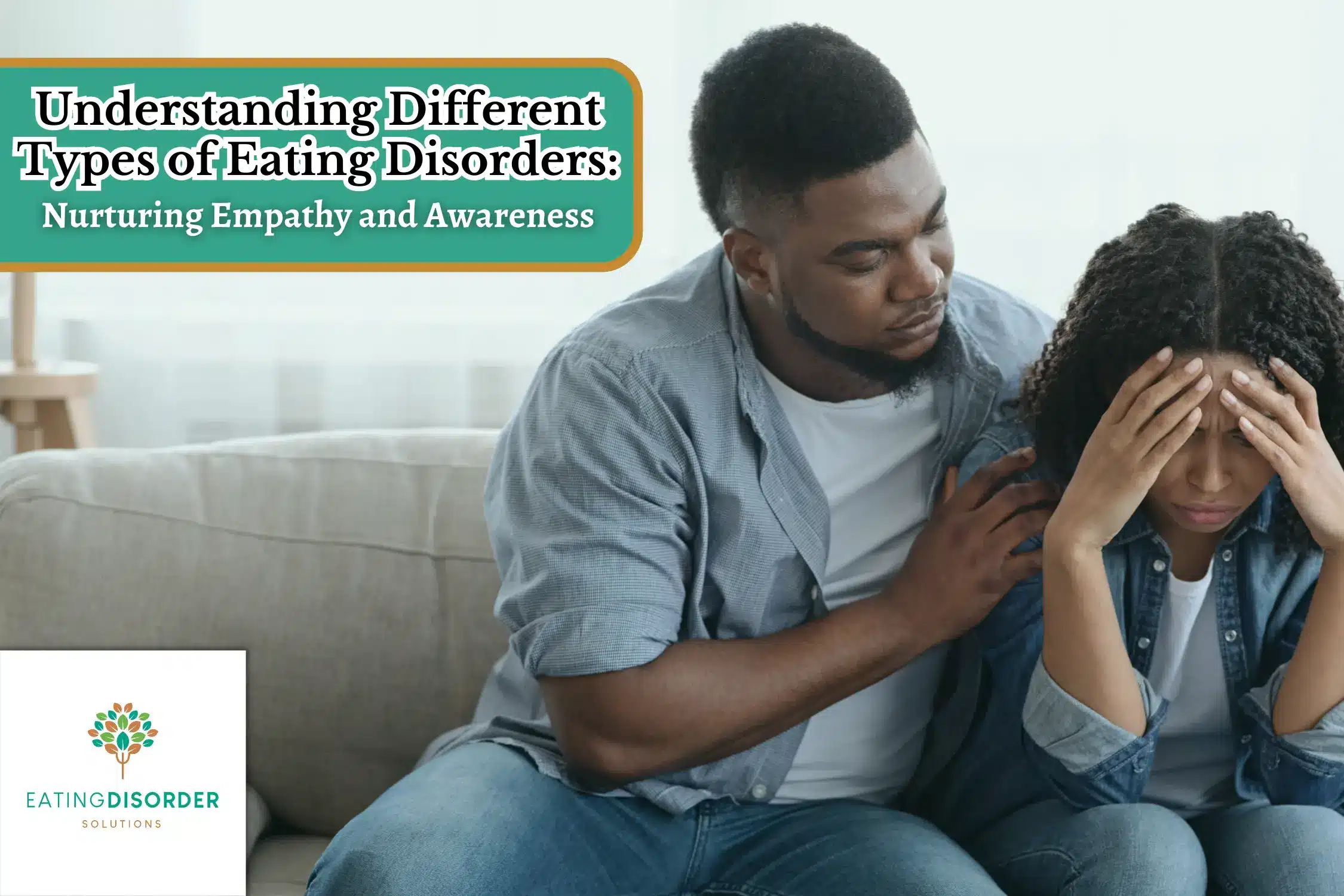As many of us know, life is not always easy. There are a lot of ups and downs – and sometimes it can feel as if the “down” part of life is always in first place. People struggle with many different circumstances, situations, illnesses, and feelings, and it can be even harder if no one around you understands or supports you.
Eating disorders are a struggle that affects 9% of people worldwide and are among the deadliest mental illnesses. The modern world, with its advancements in technology, media, and social connectivity, has significantly impacted how we perceive ourselves and others, particularly when it comes to body image and beauty ideals. And unfortunately, this heightened exposure to unrealistic body standards, constant comparison, and the pursuit of an “ideal” appearance can exacerbate eating disorders in many ways. That’s why being aware and knowledgeable about eating disorders is so important because when others can learn empathy and understanding, it helps the world heal.
Because societal pressures and body image ideals reign supreme, it becomes crucial to foster understanding and compassion for those facing the challenges of eating disorders. Through this insightful exploration, we hope to shed light on the diverse spectrum of eating disorders, raising awareness about their profound impact on individuals’ lives.
An eating disorder is a serious mental health condition characterized by abnormal eating habits and behaviors that have a detrimental impact on a person’s physical and emotional well-being. These disorders often involve extreme disturbances in eating patterns and attitudes toward food, weight, and body image. They can affect people of any age, gender, or background. They are not solely about food but are complicated and multifaceted conditions with various psychological, social, and cultural factors contributing to their development.
By cultivating empathy and raising awareness, we can build a supportive community and encourage open conversations about eating disorders.
Anorexia Nervosa: The Struggle for Control
Anorexia nervosa is characterized by an obsessive fear of gaining weight, leading to extreme calorie restriction and weight loss. Behind this disorder often lies a desperate need for control and an unhealthy focus on achieving an unrealistic body image. It’s crucial to recognize the psychological turmoil and refrain from reducing these struggles to mere willpower or vanity.
Anorexia nervosa is incredibly difficult to manage due to its combination of physical, emotional, and psychological factors. Here are some reasons why it is so challenging:
- Psychological Strain: Anorexia often stems from a deep-seated psychological conflict. Individuals with anorexia may have distorted body image perceptions, viewing themselves as overweight even when dangerously underweight. This distorted perception creates a relentless desire to lose weight, leading to a perpetual cycle of self-deprivation.
- Constant Battle with Food and Body Image: People with anorexia face an internal battle with food on a daily basis. They must constantly resist the natural instincts of hunger, which leads to extreme deprivation and self-denial. Additionally, they often experience a profound dissatisfaction with their body, contributing to a negative self-image and feelings of worthlessness.
- Health Complications: Severe weight loss and malnutrition associated with anorexia can lead to various health complications. These may include cardiovascular problems, electrolyte imbalances, hormonal disruptions, weakened immune systems, and osteoporosis. The physical toll of anorexia can be life-threatening.
- Social Isolation and Misunderstanding: Anorexia is often misunderstood by others who may perceive it as a mere lifestyle choice or a quest for beauty. This lack of understanding can lead to judgment, criticism, or dismissal of the severity of the disorder, causing the individual to feel isolated and unsupported.
Overcoming anorexia requires a comprehensive and multidimensional approach involving medical, psychological, and nutritional support. It’s crucial to approach individuals with empathy, understanding that their struggles are not a matter of willpower or vanity but a manifestation of deep emotional pain and distress. Professional treatment and a supportive environment are essential in helping individuals with anorexia embark on the path to recovery and reclaim their lives from the grips of this challenging disorder.
Bulimia Nervosa: The Cycle of Binging and Purging
Bulimia nervosa involves episodes of binge eating, followed by compensatory behaviors like self-induced vomiting, excessive exercise, or laxative use to purge the calories. The shame and guilt that follow binging episodes perpetuate this harmful cycle. Acknowledging the emotional distress behind these behaviors and offering support without judgment is essential in their path to recovery.
Struggling with bulimia nervosa can be incredibly challenging and emotionally taxing for individuals affected by the disorder. Here are some reasons why bulimia is so difficult to cope with:
- Secretive Nature: Bulimia often thrives in secrecy. Individuals with bulimia may feel ashamed and embarrassed about their binge-purge behaviors, leading them to hide their struggles from friends and family. The burden of keeping the disorder a secret can add to the emotional stress and isolation experienced by those affected.
- Shame and Guilt: After a binge-purge episode, individuals with bulimia often experience overwhelming feelings of shame, guilt, and self-disgust. This vicious cycle of binging and purging further fuels negative emotions, perpetuating the disorder.
- Physical Health Consequences: Frequent binge-purge cycles can take a toll on the body. The purging behaviors can lead to electrolyte imbalances, dehydration, gastrointestinal issues, dental problems, and damage to the esophagus and teeth due to stomach acid exposure. These health issues can be distressing and contribute to feelings of physical weakness and vulnerability.
- Mental and Emotional Exhaustion: Constantly battling with food, body image, and self-control can lead to mental and emotional exhaustion. The preoccupation with food and weight and the shame associated with the disorder can consume a significant amount of mental energy and impact one’s ability to focus on other aspects of life.
- Escalating Binge-Purge Cycles: Over time, the frequency and intensity of binge-purge cycles may escalate, making it increasingly difficult to break the cycle and seek help. As the disorder progresses, regaining control over eating habits and emotions becomes more challenging.
- Relapse Tendencies: Recovery from bulimia is not always linear, and individuals may experience relapses. Relapse can be discouraging and create feelings of failure, making it even more challenging to stay committed to recovery.
Overcoming bulimia requires professional treatment, support from loved ones, and a commitment to healing. Building a compassionate and understanding support system is crucial in helping individuals with bulimia navigate recovery challenges and regain control of their lives and relationships with food.
Binge Eating Disorder: Coping with Emotional Eating
Binge Eating Disorder (BED) entails recurring episodes of consuming large amounts of food, often to cope with negative emotions or stress. Unlike bulimia, individuals with BED do not engage in purging behaviors. Instead, they experience intense guilt and shame after these episodes, further exacerbating their emotional distress. Empathy and understanding can help break the cycle by offering alternative coping strategies and promoting self-compassion.
Struggling with binge eating disorder (BED) can be incredibly difficult and emotionally challenging for individuals affected. Here are some reasons why struggling with binge eating is so difficult:
- Emotional Turmoil: Binge eating often serves as a way to cope with emotional distress, stress, or negative feelings. However, after the binge episode, individuals with BED may experience intense guilt, shame, and self-criticism, exacerbating their emotional turmoil. The emotional rollercoaster can be exhausting and lead to a cycle of bingeing to escape negative emotions.
- Feeling Out of Control: During a binge episode, individuals with BED lose control over their eating behavior. This feeling of powerlessness can be distressing and contribute to a sense of helplessness and self-disgust, further perpetuating the disorder.
- Weight Gain and Body Image Concerns: Frequent overeating episodes in BED can lead to weight gain, which may trigger body image concerns and dissatisfaction. The distress over body weight and shape can fuel further emotional eating and exacerbate feelings of low self-esteem.
- Lack of Coping Mechanisms: Binge eating often becomes a maladaptive coping mechanism for dealing with life’s challenges and emotional distress. Without healthier coping strategies, breaking free from the cycle of binge eating can be challenging.
- Feeling Misunderstood: Binge eating disorder is often misunderstood or dismissed as a lack of willpower or discipline. This lack of understanding from others can lead to feelings of isolation and hinder individuals from seeking help.
Overcoming binge eating disorder requires professional treatment, support from loved ones, and a compassionate approach to self-healing. Encouraging open conversations about BED, challenging diet culture, and fostering a supportive environment can help individuals with this disorder find the strength and resources to navigate the difficult path to recovery.
Other Specified Feeding or Eating Disorders (OSFED): Validating All Struggles
OSFED, known as Other Specified Feeding or Eating Disorders, is a category that encompasses various eating disorders that don’t fit the specific criteria of anorexia, bulimia, or binge eating. Despite not fitting neatly into these categories, individuals with OSFED still face significant challenges and deserve compassion and support. Examples include atypical anorexia, purging disorder, and night eating syndrome. Acknowledging the uniqueness of their struggles is crucial for encouraging inclusivity and providing appropriate assistance.
Struggling with (OSFED) can be just as difficult and emotionally challenging as other diagnosed eating disorders. Here are some reasons why struggling with OSFED is so difficult:
- Uncertainty and Ambiguity: Unlike more well-defined eating disorders like anorexia or bulimia, individuals with OSFED may struggle with a mix of disordered eating behaviors that don’t fit neatly into one category. This ambiguity can lead to confusion, making it harder to identify the issue and seek appropriate help.
- Delayed or Missed Diagnosis: Due to the lack of specific diagnostic criteria for OSFED, individuals may face challenges in receiving a timely and accurate diagnosis. Delayed or missed diagnosis can prolong suffering and prevent access to targeted treatment.
- Unique and Complex Symptoms: OSFED encompasses a wide range of symptoms, which can be unique and complex for each individual. These symptoms may include atypical anorexia, purging disorder, night eating syndrome, or combinations of behaviors that vary greatly from person to person. Addressing this diversity requires tailored treatment plans.
- Feeling Overlooked or Invalidated: People with OSFED might feel overlooked or invalidated because their eating disorder doesn’t fit a well-known label. This sense of not fitting into a recognized category can make it challenging for them to seek help or share their struggles with others.
- Lack of Awareness and Support: OSFED is less well-known than other eating disorders, which can result in a lack of awareness and support from society and even healthcare professionals. This dearth of understanding may make it harder for individuals to find appropriate resources and treatment options.
Overcoming OSFED requires recognizing the complexity and validity of each individual’s experience and a personalized treatment approach. A multidisciplinary team of healthcare professionals, including therapists, dietitians, and physicians, can provide the necessary support to address the disorder’s physical and emotional aspects. Offering kindness and understanding to those with OSFED is crucial in helping them navigate their challenges and find a path toward healing and recovery.
Developing A Healthier Relationship With Food
Understanding different types of eating disorders is an essential step toward building a compassionate and empathetic society. People grappling with these disorders are not defined by their conditions; they are individuals battling internal forces, seeking solace, support, and understanding. As we learn more about these disorders, we must remember that each person’s experience is unique. Try to avoid making assumptions or stigmatizing those who suffer, and instead, strive to be a pillar of support and encouragement.
If you or someone you know is struggling with an eating disorder, remember that professional help is available. Reach out to us today to get started on the journey towards healing and recovery. Together, we can break down the barriers of stigma, offering empathy and understanding to help those affected reclaim their lives and embrace their worth beyond appearances.



